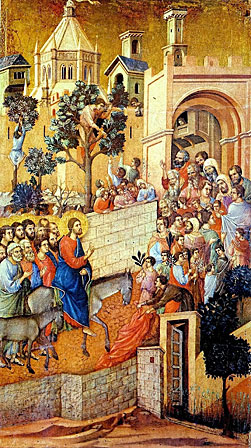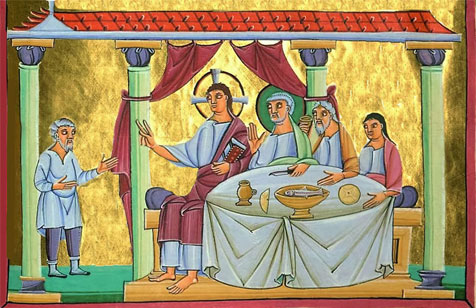
Jesus in Jericho by Deborah Beach Giordano
Joshua Fought the Battle…
 As most of you know, Jesus’ “real name” was Yeshua, that is: Joshua. And here we find him in Jericho. Ring any bells? Need a hint? How’s this: “And the walls came a-tumbling down.”
As most of you know, Jesus’ “real name” was Yeshua, that is: Joshua. And here we find him in Jericho. Ring any bells? Need a hint? How’s this: “And the walls came a-tumbling down.”
So… Did the Lord’s disciples — did the citizens of Jericho — think there might be trouble when this modern day Joshua came into town at the head of an army of followers? Is that why there was such a large crowd pressing in around Jesus? Were they surrounding Him, escorting him through the city, concerned that he might start an uprising? Were they watching to see if he was carrying a trumpet?
We are not told if Jesus was cheerfully welcomed or carefully observed as he made his way through Jericho. The city was not known for its piety, but as a resort for the rich and famous, a sort of first century Monaco: a place of lavish spending, extravagant entertainment, rich foods, expensive wines, exotic spices — and, in keeping with Roman tradition — extensive taxation.
Up a Tree
 As chief tax collector of the city, Zacchaeus would have been very rich, indeed (especially as tax assessors were rumored to operate under the system of “one for Caesar and one for me”). The author makes makes a point of commenting on the man’s small stature, a rarity in the Gospels, which have little interest in physical appearances. The description is not informative, but dismissive, demeaning, letting us know that this “big shot” was minuscule, a mere flea on the hide of the Empire — with, no doubt, a tiny, stony heart to match.
As chief tax collector of the city, Zacchaeus would have been very rich, indeed (especially as tax assessors were rumored to operate under the system of “one for Caesar and one for me”). The author makes makes a point of commenting on the man’s small stature, a rarity in the Gospels, which have little interest in physical appearances. The description is not informative, but dismissive, demeaning, letting us know that this “big shot” was minuscule, a mere flea on the hide of the Empire — with, no doubt, a tiny, stony heart to match.
Little Mr. Big perched himself on a branch, ready to look down on Jesus and His entourage. Zacchaeus may have been up there to get a good view, but it is possible that he had sought higher ground for safety. Perhaps he was worried about what a potential Joshua 2.0 might do, but he could also be in danger from the local people: nobody loves the taxman.
So there he sat, aloof, aloft, separated from the riff-raff, screened by dense leaves; watching and waiting. Zacchaeus heard the murmur of voices growing louder, the clip-clop of donkey hooves, the laughter of children, the steady march of footsteps approaching.… Then, suddenly, there He was: this strange and glorious yet terrifying man, this Joshua of the new age, the man Jesus.
No Escape
The tax collector shrank back, glad, for once, of his small stature, uncomfortable and uncertain, feeling exposed, vulnerable: out on a limb.
Where can I go to escape Your Spirit? Where can I flee from Your presence? If I ascend to the heavens, You are there; if I make my bed in Sheol, You are there.
~ Psalm 139:7-8
The Lord stopped directly beneath the tree. Their eyes met. “Come down from there, Zacchaeus,” he said, “I must stay at your house today.”
Jesus not only saw Zacchaeus in his hideout among the leaves, He called him by name, insisted that he come down — and invited Himself to stay at the man’s house. The poor fellow must have been so surprised that he almost fell out of the tree. Perhaps he nearly did, for there was no delay: we are told that he was on the ground immediately.
Any fear or trepidation vanished; Zacchaeus was happy to welcome Jesus into his home; rejoicing in it, in fact. Cynics might suspect that the cause of his delight was the opportunity to show off his wealth — after all, “he was very rich.” It was possible that Mr. Big hoped to impress the Lord with his palatial residence and bountiful table.

But that’s not how it turned out. Instead, Zacchaeus not only provided food and lodging for Jesus (and the disciples, surely), but showed Him all that he wanted to share. He was no longer going to be known as “very rich,” but very generous. And he promised to make restitution — fourfold! — to any he had cheated or defrauded. Meeting Jesus brought about an extraordinary change in our taxman: he was reformed — re-formed. It reminds me of a line in Dr. Suess's story of the Grinch:
"They say that the Grinch’s small heart grew three sizes that day.”
Jesus is in the House
The change began the moment Zacchaeus encountered the Lord, when he was truly seen — recognized for himself, as he was; on his own, without wealth or power to shield him. There he sat, revealed, despite his effort to hide; naked, despite the covering of leaves; called out, called down to earth. Yet there was no cause for fear — surprisingly, I should think, for Zac was no paragon of virtue — instead, this extraordinary person offered him hospitality. For, in a strange way, when Zacchaeus brought Jesus into his home, Jesus was bringing him Home: making Zacchaeus welcome, restoring his sense of worth, affirming his place in God’s family.

Zacchaeus no longer needed to be a big shot, to set himself above others, to expand his authority, to enlarge his wealth — it was enough to simply be who he was: “a child of Abraham;” included in an ancient holy Promise, loved and cherished for himself. There was no need to “prove” his worth, only the opportunity to respond to love with love.
Released from the compulsion of accumulation, Zacchaeus was free. He was free to take delight in caring for others; rejoicing in hosting Jesus and His disciples, in giving generously, in acts of justice and mercy — in “living large” by living with abundant joy and boundless compassion.
Whether we’re tall or small or anywhere in between, that is a lesson that fits us all.
May Christ’s gentle grace and deep joy abound,
Deborah ✟
Suggested Spiritual Exercises
What distracts you — even, possibly, imprisons and prevents you — from living fully and joyfully?